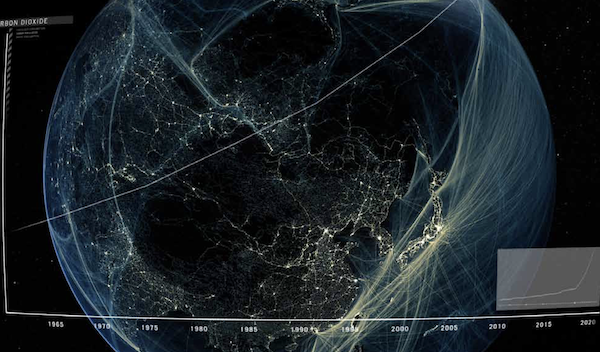IMPORTANT NOTE
Due to COVID restrictions the course starts online. To register please use Moodle or send an email to Prof. Pasquinelli and Prof. Türetken.
Human civilization has changed this planet forever, the studies of the Anthropocene remind us. The planetary scale of climate change, environmental pollution, resource extraction, labour logistics, and the ongoing COVID pandemic has also affected the scale of our perspective and political responsibility. It challenges us to reconsider actions such as carbon negative design, changing supply chains, organising trade unions or redesigning materials that might not suffice to transform social systems that we live in.
But how do we get to know an “object” as complex as the planet, as abstract as climate statistics or as invisible as a virus? How do we produce knowledge around these phenomena and a complex paradigm such as the Anthropocene? This course seeks an answer to a simple question of large implications: “How do we know the world?”
The course investigates the role of mediation of technology, media, design, natural sciences and philosophies of nature in the making of our worldview. It studies how “nature” has always been a theoretical construction and the projection of technical instruments and collective expectations before being simply a datum. It engages with the growing body of literature on the Anthropocene from the angle of decolonial studies and material epistemologies reading authors such as TJ Demos, Lorraine Daston, Paul Edwards, Kate Crawford, Elizabeth Povinelli and Jürgen Renn among others.
Methodologically, the course rejects the opposition of theory and praxis, knowledge and agency – instead these notions remain intertwined in order to understand how complex knowledge is always generated by doing — by design, machines, labour, tools, measuring devices, material and instrumental acts. Students are invited to conceive projects and interventions that question and breach into the domain of knowledge production and the collective imaginary about the environment and the planet. They are invited to get familiar with disputes and inhabit controversies as a method of collective knowledge production in itself.
A certificate (Schein) is possible with credit in Media Philosophy or Product Design. Students can a) make a project or a presentation in class and write a short essay of ca. 10 pages, or b) write an extensive essay of ca. 20 pages. All materials will be shared via Dropbox. Visiting students have to apply for the position of freemover or audit student.
Prof. Dr. Matteo Pasquinelli (Media Philosophy)
Consultation hours: Mondays, 14:00-17 :00, online.
mpasquinelli [∂] hfg-karlsruhe.de
Prof. Dr. Füsun Türetken (Product Design)
Consultation hours: TBA.
ftueretken [∂] hfg-karlsruhe.de
Room: online
Mondays, 10 am-1pm. Weekly
Course start: 19 April 2021
Language: English
Basic bibliography (excerpts from):
- TJ Demos, Against the Anthropocene: Visual Culture and Environment Today, Berlin: Sternberg Press, 2017.
- Lorraine Against Nature, Cambridge, MA: MIT Press, 2019.
- Paul Edwards, A Vast Machine: Computer models, climate data, and the politics of global warming. Cambridge, MA: MIT Press, 2010.
- Elizabeth Povinelli, Geontologies: A requiem to late liberalism. Duke University Press, 2016.
- Cate Crawford, Atlas of AI: Power, Politics, and the Planetary Costs of Artificial Intelligence, Yale University Press, 2021.
- Jürgen Renn, The Evolution of Knowledge: Rethinking Science for the Anthropocene. Princeton University Press, 2020.
Extra links:
- Anthropocene Campus Venice 2021
Water Politics in the Age of the Anthropocene
Deadline applications: 25 April 2021 - Visualizing Extinction
Phd project by Mariana Silva at HfG Karlsruhe - Inhabitants TV
Documentary reporting platform

